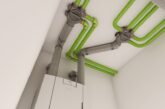
A new construction technique, known as Insulated Concrete Formwork (ICF) is sweeping through the construction sector. One of the leading players, Jackon UK, outlines some of the advantages of the system.
Given its many benefits, and also the fact that ICF (insulated concrete formwork) has been popular in Europe and in America for quite a few years, the only surprise is that ICF is not yet so well-known in the UK. With the growing popularity of Jackon’s Jackodur Atlas for foundation systems and Thermomur for wall construction, as well as the activity of other brands in the market and promotion by the Insulating Concrete Formwork Association (ICFA), that may be about to change.
The ICF system integrates insulation materials into the concrete formwork, which totally changes and modernises the way houses are constructed. It enables an energy efficient building method which creates insulated structural walls and floors for residential and commercial buildings.
As well as being easier and quicker to build, an ICF house provides massive advantages during the life of a building, when compared to brick build, timber frame or any other building technique traditionally used in the UK. The benefits include dramatically improved insulation and therefore reduced expenditure on heating or cooling; excellent acoustic performance; fire resistance; enhanced resilience to flood, extreme weather, and seismic activity; rot and vermin resistance; minimal maintenance requirement; mortgage, insurance and planning acceptance.
The energy efficiency angle is the big one for UK builders. The big push now, from the Government’s green building agenda downwards, is towards sustainability and zero energy homes. The Jackon Atlas systems have Passivhaus certification, which means they meet a number of demanding criteria, including very high levels of insulation, an airtight building fabric and ‘thermal bridge free’ construction.
This means they can be used to construct insulated slabs and external walls with a U-value as low as 0.11. When this highly energy efficient structure is combined with full use of renewable technologies, such as solar PV, mechanical heat recovery and rainwater harvesting, you are well on the way to a zero-energy house.
For the builder, the combination of an insulated slab system – together with ICF walls – avoids the need to tie together two separate systems. Since Jackodur Atlas is made to measure, it means virtually no wastage on site. The combined system makes possible the achievement of an excellent pre-build EPC rating of A.
In some locations, due to the great strength that they give to buildings, the durability of ICF systems is the main attraction. International evidence is showing that they are more resistant to damage from hurricanes and other violent weather events, for example.
![]()
A further benefit for builders is the ease with which the systems, sometimes compared to oversize Lego blocks, are used in the construction process. Developers are finding they can build a house using the ICF system in just a few weeks, with part of this speed being attributable to not having to work with timber frames. The speed of the build programme is also facilitated by the integration of the building components and a reduction in the need for extra onsite labour, especially in comparison to timber frame.
Even those builders who have always built with timber frame are becoming disillusioned, due to the rapidly rising cost of timber, its decreasing quality, and erratic tolerances. In these circumstances ICF can be the answer. A major bonus of using ICF is integration of an inbuilt stability, with strength, insulation, and airtightness all in one go.
At the heart of the product range is the company’s more than 60 years’ expertise in EPS and XPS manufacturing to this market. Jackodur Atlas Extruded Polystyrene (XPS) insulation and formwork system is an intelligent and efficient thermal insulation system for floor slabs and is ideal for constructing the foundations of energy-efficient houses.
The system comprises an economic interlocking system, which eliminates thermal bridges and has stable compressive strength properties. Supplied cut to size, rapid and problem-free construction is assured.
For the most energy efficient buildings, this should be used in conjunction with Jackon Thermomur. This is a robust pre-formed block with a hollow core manufactured from Expanded Polystyrene (EPS). The empty core in the block is filled with a concrete pour during construction.
This system facilitates fast and easy installation on site and brings all the advantages of very high insulation levels, elimination of thermal bridging, air tightness, moisture and mould resistance and acoustic insulation.
These systems have planning and insurance approvals and conform to all the relevant British Standards. Critically they also have BBA Accreditation.
With obvious appeal both to professional builders and the self-build market, on account of the relative simplicity of construction and the modern, energy efficient buildings which can be created, it seems highly likely that ICF can now only increase in popularity in the UK market.
For further information on Jackon UK visit https://www.jackon-insulation.co.uk/







